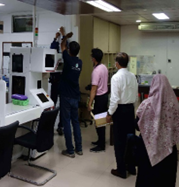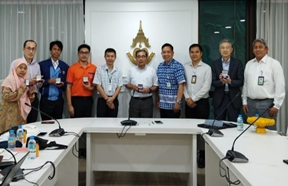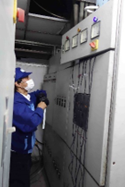ECCJ implemented a carbon neutrality diagnosis in Thailand as part of the FY2023 energy conservation support project for ASEAN countries
<Dispatch of experts>
Under the instruction and financial support of the Agency for Natural Resources and Energy (ANRE), the Energy Conservation Center, Japan (ECCJ) visited the Phra Nang Klao Hospital (PNK Hospital) in Thailand during the three-day period between November 28 and 30 as part of the current fiscal year’s AJEEP*1 Scheme 5 activities. The purpose of the visit was to collect information and data in order to make proposals for the ZEB*2 improvements required to realize carbon neutrality (CN) at the hospital.
Going forward, repeated considerations will be made into the ZEB improvement proposal details to enable presentation of the results at an intermediate meeting to be held in late February next year which will gather together persons related to ASEAN countries.
 |
 |
 |
| Measuring the indoor environment | Group photograph | Measuring electric power |
1. Schedule: Tuesday, November 28 to Thursday November 30, 2023
2. Destination visited: PNK Hospital, Bangkok, Thailand
3. Participants:
(1) Four persons from the ECCJ International Cooperation Division
(2) Five persons from the PNK Hospital
(3) One person from DEDE*3
(4) One person from the ASEAN Centre for Energy (ACE)
4. Outline of visit:
(1) Objectives:
To gain an adequate understanding from the diagnosis site on AJEEP Scheme 5 and CN project forming
To obtain the information and data required to make proposals for ZEB improvements by conducting interviews and on-site surveys
(2) Results:
1) Explained Scheme 5 and CN project forming, and gained the understanding from hospital-related persons.
2) Confirmed the hospital management, main facility specifications, operating conditions and facility improvement plans.
3) Conducted measurements of the indoor environment (temperature and humidity, CO2 concentrations and illuminance) and main facility electric power (entire building, air conditioning heat system, and compressors) and collected data.
4) Identified the points that should be improved and further consideration from the perspective of energy efficiency and CO2 emission reductions.
5. Future plans
Based on the information and data obtained, ZEB improvement proposals will be made through discussions in online meetings held with persons related to the hospital in Thailand while compiling the proposals into a CN audit report. It is planned to present the results at the intermediate check meeting to be held in late February next year which will gather together persons related to ASEAN countries.
*1 AJEEP: ASEAN-JAPAN Energy Efficiency Partnership
Program for building EE&C capacity in the ASEAN region by dispatching experts and implementing training in Japan
*2 ZEB: Net Zero Energy Building
*3 DEDE: Department of Alternative Energy Development and Efficiency, Ministry of Energy, Thailand

